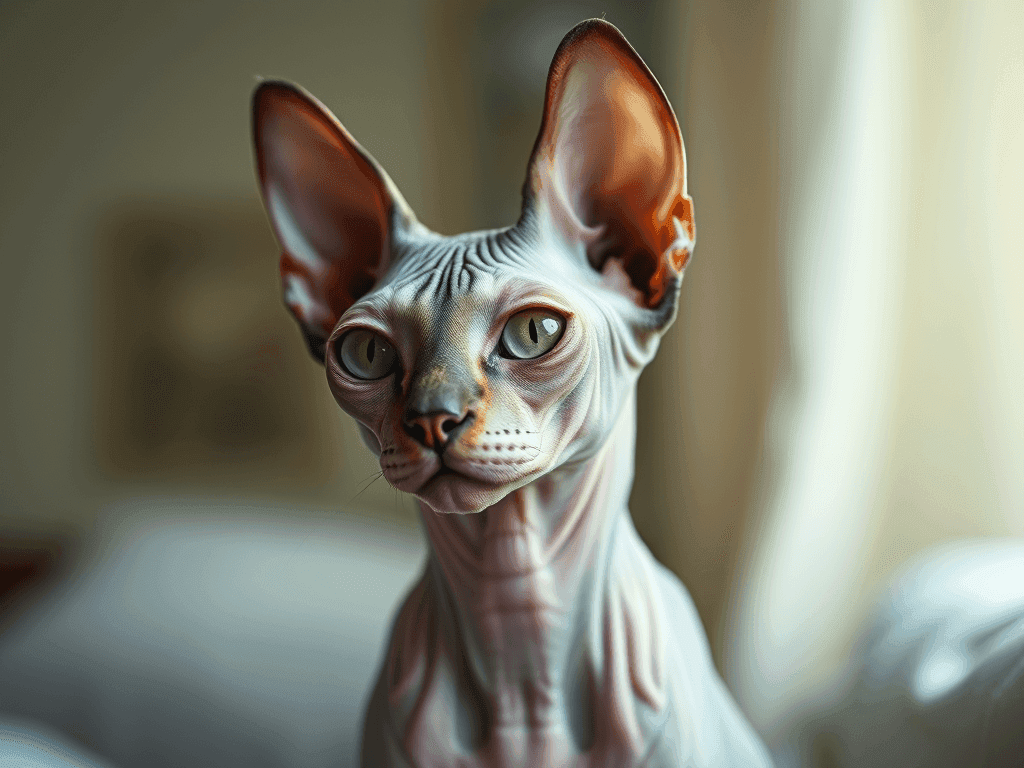Sphynx cats are unique, hairless felines that require special care to maintain their health. From regular health checks to addressing genetic predispositions, it’s crucial to understand their specific needs. In this in-depth guide, we’ll cover the common Sphynx cat health concerns, preventive measures, and how to keep them healthy for years to come.
Common Health Issues in Sphynx Cats
Sphynx cats, like all breeds, can suffer from genetic and environmental health conditions. One of the most common issues is Hypertrophic Cardiomyopathy (HCM), a hereditary heart disease. Regular heart screenings are essential to detect early signs and manage the condition. Cornell Feline Health Center highlights that heart disease is a common issue among cats, and Sphynx cats are no exception.
In addition to heart disease, Sphynx cats are prone to skin infections due to their lack of fur. Without fur, oils that would normally be absorbed by the coat accumulate on the skin, leading to clogged pores and infections if not cleaned regularly. Proper skin care and routine baths are essential to keeping your Sphynx’s skin healthy.
Ear infections are another concern. Since Sphynx cats lack fur, they are more prone to wax buildup in their ears, which can lead to infections. Regular ear cleanings are vital to avoid this.
Lastly, obesity can be an issue due to their high metabolism. Sphynx cats need a high-protein diet to maintain their energy levels and prevent excess weight gain.
Read more about Common Health Issues in Sphynx Cats.
Genetic Testing For Sphynx Cats & HCM
One of the most important aspects of Sphynx cat health is genetic testing. Hypertrophic Cardiomyopathy (HCM) is the most significant genetic health concern for this breed. Ethical breeders will perform regular HCM screenings on their breeding cats to prevent passing on this condition.
According to International Cat Care, early diagnosis is key to managing HCM and prolonging a cat’s life. Potential owners should always request health documentation from breeders to ensure the cat has been screened for HCM and other hereditary conditions.
Other Genetic Conditions: Some Sphynx cats may also be prone to gingivitis, a genetic dental issue. Regular dental checkups and cleanings are critical to preventing infections that could spread to other parts of the body.
Learn more about Genetic Testing & HCM in Sphynx Cats.
Parasite Prevention in Sphynx Cats
Sphynx cats are susceptible to parasites just like any other breed. However, because they lack fur, parasites such as fleas, ticks, mites, and intestinal worms may be more visible. Regular parasite prevention, including topical treatments or oral medications, is crucial.
Ear Mites are another common problem in Sphynx cats due to their large, exposed ears. Frequent ear cleanings with a veterinarian-approved solution can help prevent ear mite infestations and ear infections.
It’s important to work with your vet to choose the best flea, tick, and worm preventatives for your Sphynx. The ASPCA offers tips on how to handle parasite prevention safely.
Discover tips for Parasite Prevention for Sphynx Cats.
Veterinary Care & Checkups
Regular vet checkups are essential for maintaining the health of your Sphynx cat. Annual or biannual visits are recommended to monitor their heart, skin, ears, and overall health. Early detection of potential issues like HCM, skin infections, or dental problems can save your cat from long-term complications.
During routine visits, your vet may conduct blood tests, check your cat’s weight, and examine their skin for infections or irritations. Regular dental cleanings are important as well, since gingivitis can quickly develop into more severe infections.
Vets will also help you set up a vaccination schedule to protect your cat from common feline diseases.
Explore best practices for Veterinary Care & Checkups for Sphynx Cats.
Vaccination Protocols for Sphynx Cats
Vaccinations play a critical role in preventing diseases such as Feline Viral Rhinotracheitis, Calicivirus, Panleukopenia (FVRCP), and rabies. Even if your Sphynx is an indoor cat, vaccinations are still necessary.
Kittens should receive their first set of vaccinations at around 6-8 weeks old, with booster shots every few weeks until they are about 16 weeks old. After that, annual booster vaccinations will keep your cat protected. Discuss with your vet the right vaccination schedule for your Sphynx cat based on their lifestyle and health condition.
Post-vaccination care is equally important. Watch for any adverse reactions like lethargy or swelling, and consult your vet if you notice anything unusual.
Learn about the recommended Vaccination Protocols for Sphynx Cats.
Sphynx Cat Nutritional Needs
Because of their high metabolism, Sphynx cats need a high-protein diet to maintain their energy levels and muscle mass. Choose food that is rich in animal proteins and fats to support their overall health.
Wet food, in addition to dry kibble, can help keep your Sphynx hydrated, which is important for their skin health. Make sure you provide fresh water at all times to avoid dehydration. Some owners also supplement with fish oil to support healthy skin and reduce dryness.
Check out our guide on the Best Food for Sphynx Cats.
Conclusion
Caring for a Sphynx cat’s health requires a combination of regular veterinary visits, preventive measures like genetic testing and vaccinations, and attention to their unique needs like skin care and nutrition. By staying on top of these requirements, you can ensure your Sphynx lives a long, healthy, and happy life.
For more information, explore our individual guides on Sphynx cat health topics, or consult your veterinarian for personalized care recommendations.
Check out the available kittens at Purradox Sphynxery and like us on Facebook.


